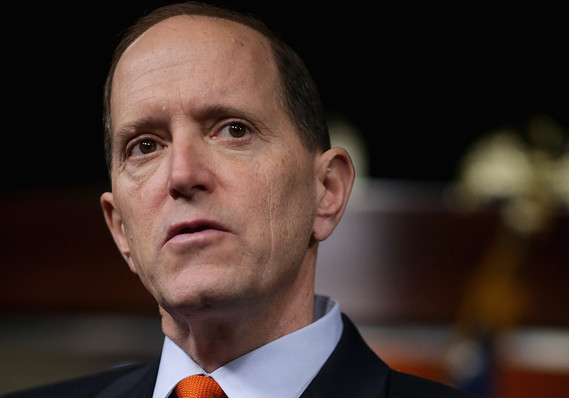U.S. House Ways and Means Committee Chairman Dave Camp (R-MI) has proposed legislation he says will fix the nation’s broken tax code by lowering tax rates while making the code simpler and fairer for families and job creators. House and Senate leaders have given it a tepid response.
Camp’s “Tax Reform Act of 2014” would reduce the number of tax “loopholes” while making it easier for individuals to complete their own tax returns confidently and accurately, Camp says.
“It is no secret that Americans are struggling,” Camp said in announcing his plan. “Far too many families haven’t seen a pay raise in years. Many have lost hope and stopped looking for a job. And too many kids coming out of college are buried under a mountain of debt and have few prospects for a good-paying career. We’ve already lost a decade, and before we lose a generation, Washington needs to wake up to this reality and start offering concrete solutions and debating real policies that strengthen the economy and help hardworking taxpayers. Tax reform is one way we can do that.”
In a Feb. 26 op-ed in The Wall Street Journal, Camp pointed out the United States hasn’t enacted major tax reform since 1986, while many other nations, including Canada and Mexico, have made major changes in their tax laws to make their nations more competitive economically.
The U.S. tax laws are so complex that Nina Olson, the IRS National Taxpayer Advocate, estimates Americans spend more than six billion hours and $168 billion annually to file their returns.
‘Deserves a Lot of Praise’
“Chairman Camp has undertaken a monumental task in a thoughtful, forthright manner, for which he deserves a lot of praise,” said Pete Sepp, executive vice president of the National Taxpayers Union. “Wherever they stand on the particulars, taxpayers should welcome the beginning of the serious, methodical debate that this proposal ought to engender.”
“It’s too soon to condemn or to jump on board all of the tradeoffs made in this plan, and of course any tax reform plan is going to have details that are deal-killers for specific groups, but Mr. Camp’s focus on tax reform as a major initiative to drive greater economic growth and job creation is refreshing and admirable,” said Tom Giovanetti, president of the Institute for Policy Innovation.
Leaders Noncommittal
House Speaker John Boehner (R-OH) declined to endorse Camp’s plan. In a press conference, he laughed at the notion of the bill coming up for a vote this year and called it a “discussion draft” that will start a “conversation” about the federal tax system. House Budget Committee Chairman Paul Ryan (R-WI) also would not commit to action on the plan, though he told reporters “the status quo is indefensible.”
Senate Minority Leader Mitch McConnell (R-KY) told reporters “I have no hope” about the Camp plan being approved this year. Senate Majority Leader Harry Reid (D-NV) also said he doubts the bill will go anywhere.
“Even though most observers believe it will not receive a vote this year, this draft is a marker that can jumpstart the debate instead of continuing abstract discussions about individual tax breaks or the preferred top rate,” said Ryan Alexander, president of Taxpayers for Common Sense, in a statement.
“Many of the proposals set forth in the discussion drafts begin to remove unnecessary favoritism for certain corporate taxpayers, reduce the number of distortions in the tax code overall, and create more certainty with regard to international taxation,” he said. “Like most everyone, we won’t support every policy prescription in the draft, but we support moving forward with the debate.”
‘About More Than Reform’
Some business organizations have given the proposal a cautious thumbs-up.
“This plan would give our nation the simpler, fairer tax system that we desperately need, but it’s about far more than just tax reform,” said Matthew Shay, president and CEO of the National Retail Federation, in a statement. “This is the foundation for job creation, increased take-home pay, and business growth that would restore the prosperity that has slipped away for far too many American families.”
“At first glance, our reaction is that some provisions are encouraging, while others are troubling,” said Thomas J. Bisacquino, president and CEO of NAIOP, the Commercial Real Estate Development Association, in a statement. “We view this as the beginning of an important discussion for our country and for our economy, and we stand ready to provide our guidance so America’s commercial real estate sector can continue to grow and create jobs.”
Fewer Brackets, Simpler Code
Camp’s proposal is designed to simplify the tax code by:
- Flattening taxes by reducing rates and collapsing today’s seven tax brackets into two brackets of 10 and 25 percent for virtually all taxable income, ensuring more than 99 percent of all taxpayers face maximum rates of 25 percent or less. The plan also reduces the corporate rate to 25 percent.
- Simplifying taxation of investment income. The plan would tax long-term capital gains and dividends as ordinary income but exempt 40 percent of such income from taxation—resulting in a three percentage point decrease from the maximum rates individuals pay today on such income while achieving the lowest level of double taxation on investment income in modern history.
- Eliminating the Alternative Minimum Tax. The plan repeals the Alternative Minimum Tax (AMT) for individuals, pass-through businesses, and corporations.
- Simplifying the tax code. The plan repeals more than 220 sections of the income tax code, it by 25 percent.
- Demanding better IRS accountability. The proposal includes provisions prohibiting implementation of the Obama administration’s recently proposed rules affecting 501(c)(4) organizations and provides victims of IRS targeting with information regarding the status of investigations into violations of their taxpayer rights.



